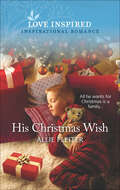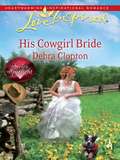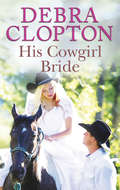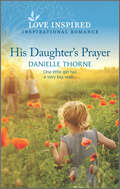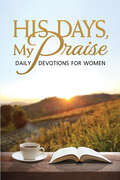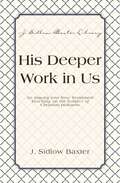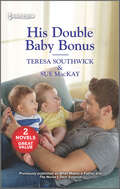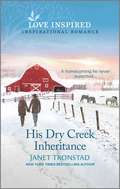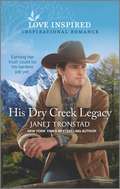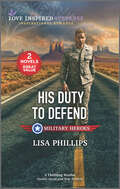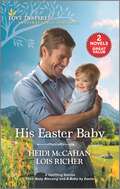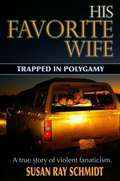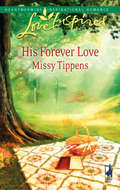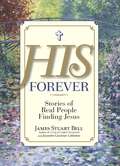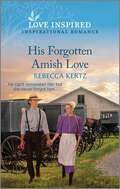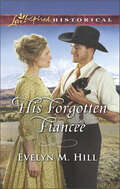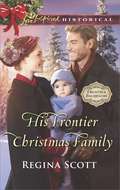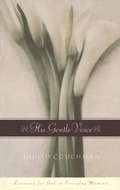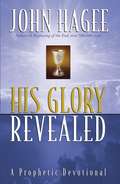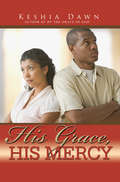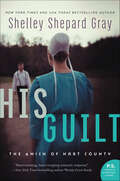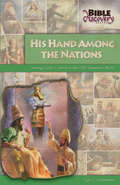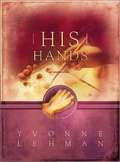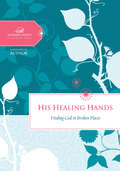- Table View
- List View
His Christmas Wish (Wander Canyon #3)
by Allie PleiterSparks fly between an orphan’s uncle and his preschool teacher in this heartwarming inspirational holiday romance.To make his little nephew happy, this bachelor will need help . . . After his nephew, Cole, is orphaned, Jake Sanders vows to give the little boy the best Christmas possible . . . except Jake doesn’t know the first thing about kids! So when Cole’s preschool teacher, Emma Mullins, offers to pitch in, Jake’s grateful for her guidance. But while Jake and Emma share an immediate connection, their blossoming love must first survive the secret she’s hiding . . . From Harlequin Love Inspired: Uplifting stories of faith, forgiveness and hope.
His Cowgirl Bride
by Debra CloptonTacy Jones had come to Mule Hollow to learn how to train wild horses. But former rodeo champion Brent Stockwell might as well carry a sign saying "No Cowgirls Allowed." If Brent doesn't think ladies belong in the pen, determined Tacy will just have to change his mind. When Tacy learns the secret behind his stance, she longs to help him heal. She's ready to show the handsome cowboy that taking a chance on your dream is what life--and love--is all about.
His Cowgirl Bride
by Debra CloptonTacy Jones had come to Mule Hollow to learn how to train wild horses. But former rodeo champion Brent Stockwell might as well carry a sign saying "No Cowgirls Allowed." If Brent doesn't think ladies belong in the pen, determined Tacy will just have to change his mind. When Tacy learns the secret behind his stance, she longs to help him heal. She's ready to show the handsome cowboy that taking a chance on your dream is what life—and love—is all about.
His Daughter's Prayer
by Danielle ThorneOne little girl has a very big wish…A mother is all his daughter wants…Might an old love be the answer to her prayers?Struggling to keep his antiques store open, single dad Mark Chatham can’t turn down his high school sweetheart, Callie Hargrove, when she offers her assistance in the shop. But his daughter is wishing for a mommy, and she’s convinced that Callie is the perfect match. As they work to save the business, will their little matchmaker reunite Mark and Callie for good?
His Days, My Praise
by Karen Hunter Jane Schlenvogt-Dew Nancy Ninman Lori Dorn Carrie Groth Mary Hochmuth Cheryl Retzlaff Sondra Retzlaff Kristen Koepsell Kris Howard Michele Paul Jerralyn Moudry365 days of uplifting, Christ-centered devotions for women by women!His Days, My Praise is an interactive way for you to delve into God’s Word every day. Each entry in this uplifting, 365-day devotional includes a “My Praise” section that allows you an opportunity to collect and reflect on your thoughts and write them down (plus extra pages in the back of the book for the same purpose).Devotions are numbered, not dated, so you can conveniently begin your journey of praise to God at any time of the year! Each devotion also includes a suggested Bible reading plan that will help you read the entire Bible over 365 days.Build up a heart of thanks for God and his work in your life with His Days, My Praise!
His Deeper Work In Us: An Inquiry into New Testament Teaching on the Subject of Christian Holiness (J. Sidlow Baxter Library)
by J. Sidlow BaxterIn His Deeper Work in Us, the importance of seeking the control and the infilling of the Holy Spirit is viewed as the key to living the victorious Christian life. Accordingly, Dr. Baxter states that “the New Testament emphasis is not so much on our being ridded of something (though that is necessarily included), but rather on being filled with a spiritual vitality and health that leaves the sin-disease no environment in which to thrive.” Drawing upon the writings of such stalwarts of the faith as D. L. Moody, Hannah Whitall Smith, Frances Ridley Havergal, A. T. Pierson, Samuel Chadwick, and others, Dr. Baxter discusses this all-important step in the Christian walk through both experience and Scripture.
His Double Baby Bonus
by Teresa Southwick Sue MacKayThe family he wasn’t expecting!What Makes a Father by Teresa SouthwickWhen ER doc Mason Blackburne discovers he is the biological father of twins, he’s doubly thrilled! But he still has to contend with Annie Campbell, the babies’ legal guardian. At first he sees her as just the gatekeeper to his babies—and then he begins to view her in a whole new light. But Mason has a past that might keep him from giving Annie the love she craves.The Nurse’s Twin Surprise by Sue MacKayER nurse Molly O’Keefe is starting over. But she isn’t ready to let sexy Dr. Nathan Lupton into her life. Still reeling from her painful past, Molly isn’t sure she can trust her feelings—especially as Nathan wants a family she may not be able to give him. But then their irresistible temptation spills over—and results in a double baby surprise that could bond them together forever!Previously published as What Makes a Father and The Nurse’s Twin Surprise
His Dry Creek Inheritance (Dry Creek)
by Janet TronstadA homecoming he never expected…in this book by New York Times bestselling author Janet Tronstad.Can a surprise inheritancebring them together for good?When he returns home after receiving a letter from his foster father, soldier Mark Dakota learns that the man has recently passed away. Now in order to get his share of the inheritance, Mark must temporarily help his foster brother’s widow, Bailey Rosen, work the ranch until her baby’s born. But as Bailey and her little girl push their way into his heart, might Mark finally find his forever family?From Harlequin Love Inspired: Uplifting stories of faith, forgiveness and hope.Dry Creek
His Dry Creek Legacy (Dry Creek)
by Janet TronstadEarning her trust could be his hardest job yet in this novel by New York Times bestselling author Janet Tronstad. Helping a single mother find a homecould give him the family he needs.In his years as a ranch hand, Joshua Spencer’s done difficult work, but nothing’s harder than convincing Emma Smitt to claim the home her unborn child inherited. Betrayed by a fake marriage, Emma is determined to make a home on her own. But now, as Joshua’s steadfast help and quiet caring earn her reluctant confidence, can they somehow secure happiness together?From Love Inspired: Uplifting stories of faith, forgiveness and hope.Dry Creek
His Duty to Defend (Military Heroes)
by Lisa PhillipsHe&’s her best hopeDouble Agent When CIA agent Sabine Laduca investigates her brother's murder, she's forced into an uneasy alliance with his Delta Force team leader. Sergeant Major Doug Richardson hides his own secrets, but nothing will stop Sabine from finding out who killed her brother—even when the CIA declares her rogue. Now not only is the killer after her, so is the agency. And only Doug can help her find the truth…and keep her safe.Star Witness After years in witness protection, Mackenzie Winters fears her cover has been blown when someone shoots at her. Could the brother of the drug lord she put away be here for revenge? Mackenzie must rely on Delta Force soldier Aaron Hanning to protect her. Aaron doesn't want to be anyone's hero, but with danger stalking them, they'll both have to make a daring choice.2 Thrilling StoriesDouble Agent and Star Witness
His Easter Baby
by Lois Richer Heidi McCahanBlessings at EasterTheir Baby Blessing by Heidi McCahan When navy veteran Gage Westbrook promised to look out for his late best friend&’s son, he never imagined he&’d bond with the baby boy. And he definitely didn&’t plan to fall for Connor&’s gorgeous temporary guardian, Skye Tomlinson. But weighted by guilt for the accident that took Connor&’s dad, can Gage find the courage to forgive himself and embrace the chance at a family?A Baby by Easter by Lois Richer Susannah Wells and her unborn baby have nowhere to turn. So when she encounters handsome lawyer David Foster, she jumps at his offer to become caregiver for his sister. Susannah knows it&’s difficult for David to let others ease his burdens. Until he shows her just what a blessing she and her Easter baby are to him. 2 Uplifting Stories Their Baby Blessing and A Baby by Easter
His Favorite Wife: Trapped in Polygamy
by Susan SchmidtHis Favorite Wife-Trapped in Polygamy details my experiences as a young girl raised in a fundamentalist, polygamist sect, an offshoot of the Mormon Church. My story begins in 1968 in Colonia LeBaron, a small settlement in Chihuahua, Mexico. At fourteen I am considered of marriageable age and sought after by several of the brethren as a plural wife. I narrowly escape marriage to Ervil LeBaron, the charismatic patriarch of the church, whose revelations from God? pressure several of the women to become his wives, and ultimately, soldiers in his army. This story will appeal to a wide audience. Filled with rich, well-developed characters, it will grab the heart and imagination of the reader. His Favorite Wife will show how intelligent, educated people, in pursuit of the highest degree of glory, can be swept into a controversial lifestyle. With many tears and even with wide brush-strokes of humor, my book will lead the reader on a journey into a lifestyle that people wonder about and shudder about. It answers the question that I've heard countless times: How could you stand to share a husband? I couldn't do it!
His Forever Love
by Missy TippensIn Magnolia, Georgia, local legend says that a couple who holds hands around the "forever" tree will have an unending love. Even so, Bill Wellington held Lindsay Jones's hands around that tree years ago. . . and then left her behind. He chose the big city, and now he wants to bring his grandmother there. But to his amazement, he finds that Granny has a boyfriend--and a vibrant life. A life that includes Lindsay, Granny's caregiver. Bill never thought he'd want to come home, yet Magnolia clearly has its charms. As does Lindsay, who makes him long for a second chance at forever love.
His Forever: Stories of Real People Finding Jesus
by James Stuart BellFor evangelical Christians, the experiences that bring them to accept Jesus as their personal Savior are among the most significant of their spiritual lives. In sharing these stories with one another they have become the touchstone of the Christian social experience. In His Forever, the first collection of such testimonials, ordinary men and women describe the extraordinary stories of their coming to Christ. This moving and inspiring anthology gives voice to the transforming power of the conversion experience for Christians everywhere--and the lasting effect of Jesus on their lives.
His Forever: Stories of Real People Finding Jesus
by Jeanette Gardner Littleton James Stuart BellFor evangelical Christians, the experiences that bring them to accept Jesus as their personal Savior are amongst the most significant of their spiritual lives. In sharing these stories with one another they have become the touchstone of the Christian social experience. Here, ordinary men and women describe their coming to Christ.
His Forgotten Amish Love: An Uplifting Inspirational Romance
by Rebecca KertzAmnesia stole their past… Can they find a future? Restaurant owner Fannie Miller&’s heart shattered when David Troyer vanished a day after asking to court her. But now David is back—with no memory of her. When Fannie&’s tasked with catering a Troyer family reunion, her plan to avoid David proves difficult…especially after she realizes he&’s still the same caring man she once dreamed of marrying. Will digging into the past lead to heartbreak a second time?From Love Inspired: Uplifting stories of faith, forgiveness and hope.
His Forgotten Fiancée
by Evelyn M. HillSuddenly ReunitedLiza Fitzpatrick is stunned when her fiancé finally arrives in Oregon City—with amnesia. Matthew Dean refuses to honor a marriage proposal he doesn’t recall, and Liza is forced to consider he may not have loved her after all. But she needs his help now to bring in the harvest, and maybe she can help him remember…Matthew is attracted to the spirited Liza, and as she tries to help him regain his old memories, the new ones they’re creating together start to make him feel whole. Even as he falls for her again, though, someone’s determined to keep them apart. Will his memory return in time to save their future?
His Frontier Christmas Family
by Regina ScottA Family Made at ChristmasAfter taking guardianship of his late friend’s siblings and baby daughter, minister Levi Wallin hopes to atone for his troubled past on the gold fields. But it won’t be easy to convince the children’s wary elder sister to trust him. The more he learns about her, though, the more he believes Callie Murphy’s prickly manner masks a vulnerable heart…one he’s starting to wish he was worthy of.Every man in Callie’s life chose chasing gold over responsibilities. Levi—and the large, loving Wallin family—might just be different. But she can tell he’s hiding something from her, and she refuses to risk her heart with secrets between them. Even as they grow closer, will their pasts keep them from claiming this unexpected new beginning?
His Gentle Voice
by Judith CouchmanOf course I pray, but. . . I don't think God wants to speak to me. Many women today feel that troubling uncertainty about their relationship with God. In His Gentle Voice, best-selling author Judith Couchman helps women recognize the still, small voice of the One who loves us and speaks to us in everyday life. Combining personal stories and practical teaching, Couchman guides women in recognizing the many subtle but important ways-conversations with friends, Scripture reading, life's circumstances, prayer, and even silence-we can hear God's gentle, unmistakable voice.
His Glory Revealed
by John HageeBestselling author and pastor John Hagee offers seven weeks of dailydevotionals that explore the meaning of the feasts of Isreal forbelievers today. A stirring look at the future through propheticmarkers from the past. And it's beautifully packaged with colorthroughout.
His Grace, His Mercy
by Keshia DawnUnder the guidance of the Almighty, Gracie has forgiven former fiancé, Dillian, and her best friend Kendra for their past betrayals. Gracie's husband, Marcus, has been a blessing by understanding the relationships and accepting the friendship of the now married Dillian and Kendra. When tragedy strikes one of the young couples, past hurts resurface that need to be resolved, and Gracie's desire to help the other couple threatens her own marriage. Only relationships based on unconditional love and faith will give them the strength to believe in God's will.
His Guilt: The Amish of Hart County
by Shelley Shepard GrayNew York Times and USA Today bestselling author Shelley Shepard Gray delivers the next novel in her Amish of Hart County series—a suspenseful tale of an Amish man who will risk all to protect the woman he loves.Mark Fisher has returned home to Hart County, determined to put the past behind him. Two years ago, after being wrongly accused of assault, he left the Amish community, though never forgot his home. When the one person who had helped him through his rough times asks for help, Mark returns. But it is pretty Waneta Cain who makes him want to stay...Neeta is one of the few people in Hart County who doesn’t believe Mark is guilty of hurting anyone. However, his worldliness and tough exterior do make her uneasy. As she begins to see the real man behind all the gossip and prejudice, she wonders if he is the man for her. Just when Mark starts to believe a new life is possible, a close friend of Neeta’s is attacked. Once again, everyone in the community seems to believe he is guilty. But what hurts most is Neeta’s sudden wariness around him. When another woman is hurt, a woman who is close to both Neeta and himself, Mark fears he knows the real culprit. And time is running out. Will Mark be able to find him before Neeta becomes his next victim?
His Hand Among The Nations: Seeing God's Control In The Old Testament World (Bible Discovery Series)
by Lyle L LuchterhandIs the Old Testament still relevant today? Does the Old Testament still matter?Have you ever wondered why the Bible includes information about the rise and fall of kingdoms, nations, prophets, royal lineage, and family trees? How does it all relate to the gospel message about Jesus Christ?If you’ve wondered about any or all of the questions above, His Hand Among the Nations shows you how—and why—God masterfully guided and shaped world events in the days of the Old Testament. Through the eye-opening historical and biblical analysis in this book, your faith will be strengthened and renewed as you begin to see the connections in the Old Testament to God’s plan of salvation!
His Hands
by Yvonne LehmanMatthew MacEwen finds the Blue Ridge Mountains a peaceful perfect home for an artist. . .until the day a plane crash destroys his calm. While pulling a young girl from the blazing wreckage, he irreparably scars his hands-and his future. When she is pronounced dead, can Matthew find a reason to go on? Sixteen-year-old Christine Norwood nearly died in the burning wreckage. . .even after a courageous young man intervened. She, too, is left with emotional scars and longs to find the man who gave her a second chance. When she does find him, six years later, Christine sees not a victorious hero but a man as turbulent as the waters ' ' of the Nantahala River. Does she dare identify herself to this broken artist, whose life was shattered by his brave deed? If Christine reveals her past to Matthew, how will he respond? Will he reject her? Or might the two find hope to overcome their fiery trials together? The Veteran novelist lives in the heart of North Carolina's Blue Ridge Mountains. The founder of the Blue Ridge Christian Writers Conference, she is the recipient of numerous /awards, including The Dwight L Moody Award for Excellence in Christian Literature as well as The National Reader's Choice and Booksellers' Best awards from the Romance Writers of America.
His Healing Hands: Finding God in Broken Places (Women of Faith Study Guide Series)
by Women Of FaithLife hurts. There's no getting around it. But surely there's a way through it? Thankfully, God meets us in the broken places. This isn't just something we can hope for but something we can expect! This study leads women to find God in broken places by examining the life of Christ, the true Healer. Each of the twelve chapters will highlight a moment in which Jesus brought healing and restoration to an individual or situation. Through this study we will find that those areas of life where we experience pain and loss can become emblems of His glory as God transforms and heals us. Features include: 12 sessions of interactive Bible study Perfect for individual or group study Tips for leading a great group included
